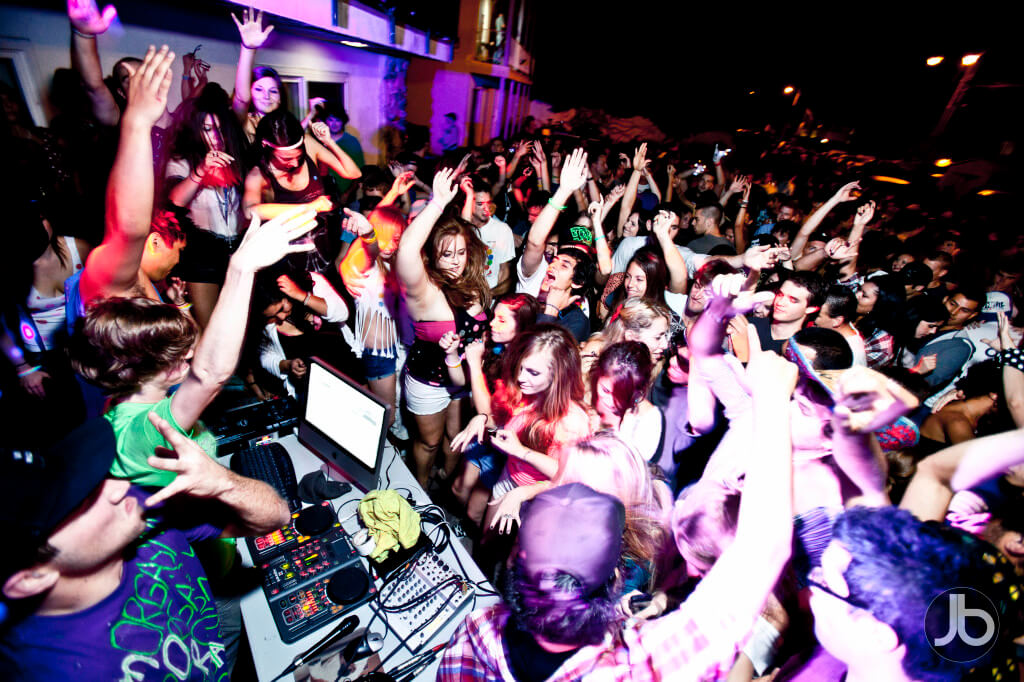Get the night started
- Are you going out tonight?
คุณไปเที่ยวมั้ยคืนนี้
kun jà bpai tîao mái kuen-níi?
(ไปเที่ยว bpai tîao = go out)
- Where are you going tonight?
คืนนี้คุณจะไปเที่ยวไหน
kuen-níi kun jà bpai-tîao năi?
- Where do you like to party?
คุณชอบปาร์ตี้ที่ไหน
kun châwp bpaa-dtîi tîi-năi?
or
คุณชอบไปเที่ยวที่ไหน
kun châwp bpai-tîao tîi-năi?
- Do you like to dance?
คุณชอบเต้นมั้ย
kun châwp dtên mái?
(เต้น dtên = to dance)
- What kind of music do you like?
คุณชอบเพลงแบบไหน
kun châwp pleeng bàeb năi?
(เพลง pleeng = song , แบบ bàeb = type/ kind/style , ไหน năi? = which? )
Ordering drinks
- Can I buy you a drink?
ผมขอเลี้ยงดื่มคุณได้มั้ย
pŏm kăw lǐang dùem kun dâai-mái?
- What do you like to drink?
คุณชอบดื่มอะไร
kun châwp dùem à-rai?
(“ดื่ม dùem” means ‘to drink’ , but it is also used for ‘a drink’ in spoken Thai which is shorten from the word เครื่องดื่ม krûeang-duèm which means ‘beverage’)
- Do you like beer or wine?
คุณชอบเบียร์หรือไวน์
Kun châwp bia rŭe waai
( หรือ rŭe = or *** when forming a question with ‘or’ remember NOT to add มั้ย mái question word )
- I’ll have a glass of Gin and Tonic please.
เอา Gin Tonic หนึ่งแก้ว
ao Gin Tonic nùeng gâew
or ขอ Gin Tonic หนึ่งแก้ว
kăw Gin Tonic nùeng gâew
- We would like to order a bottle of whisky.
เอาเหล้าหนึ่งขวด
ao lâo nùeng kùat
– ‘เหล้า lâo’ means ‘wisky’
– ‘เอา ao’ is the word used to place oreder, English equivalent would be ‘I would like to have’. Watch this video to learn to place order in detail here.
– ALWAYS use “classifier” or “unit count” every time you count. Watch the video on this lesson here.)
Cheers!
- ชน chon (hit the glass)
- หมดแก้ว mòt gâew (drink up)
- ไม่เมาไม่กลับบ้าน mâi mao mâi glàp bâan (not drunk, not go home)
- เอาให้อ้วก ao hâi ûak (drink till you puke!) * Teacher Pear likes to use this phrase.
– ‘เมา mao’ means drunk
– ‘อ้วก ûak’ means ‘to vomit, throw up’
The end of the night
- ปาร์ตี้ถึงเช้า
bpaa-dtîi tŭeng cháao
(Party until dawn)
- I don’t want to get too drunk
ผม/ชั้นไม่อยากเมามากเกินไป
pŏm/chán mâi yàak mao mâak gern-bpai
- I’m tired, I’m leaving.
ผม/ชั้นเหนื่อย กลับก่อนนะ
pŏm/chán nùeai, glàp gàwn ná
- Get home safe!
กลับบ้านดีๆนะ glàp bâan dii ná
กลับบ้านปลอดภัยนะ glàp bâan bplàwd-pai ná
The next day
- I’m hungover.
ผม/ชั้นเมาค้าง
pŏm/chán mao káang
- We had a great time last night!
เมื่อคืนสนุกมาก
mûea-kuen sà-nùk mâak



My favorite expression I learned in Chiang Mai with my friends was….
ตัวเอง…..ต้อไปกันไหม
It was a great night I learned that phrase…. มันสนุกดี
มันสนุกดี
Hi, I have read your article about Prague and I am from Prague. I saw your picture drinking
bear. If I had know it, I would have invited you to bier party. What bier is better Czech or
čaang?
I usually don’t drink beer and I have never had Chang Beer before. Thank you for your kind thoughts.
Actually, I think that “puke” might be the best translation for อ้วก. And I think the word “puke” is simply casual, not offensive. I’m guessing both words are onomatopoeic; meaning that both words mimic the sound of someone vomiting.
I’m guessing both words are onomatopoeic; meaning that both words mimic the sound of someone vomiting.
ขอบคุณค่ะคุณคีธ
Mod,
What if we order Redbull vodka?
Do you say “redbull wodka” or “krataeng daeng wodka”?
That is correct. Thank you for watching! I am happy to see that you learned something new.
A lot of useful vocabulary, very helpful and funny. ขอบคุณมากครับ
ยินดีค่ะ We are glad to hear your positive comment.
crash glass…:-)
Thank you for letting us know this. We are still learning English too.
Thank you for tour thaï expression about the party and hungover but I don’t like drinking wine and to get drunk.
It would be helpful if you could include some sound samples with this lesson
We will do the video version of this lesson in the near future. Thank you:)
Mod,very interesting read,Pear drink till you puke,not good but funny to read.
Thank you for your comment. I am happy you enjoyed the lesson.
Haha, you’re learning the foreigners bad language about drinking :p
I learned it from Pear.